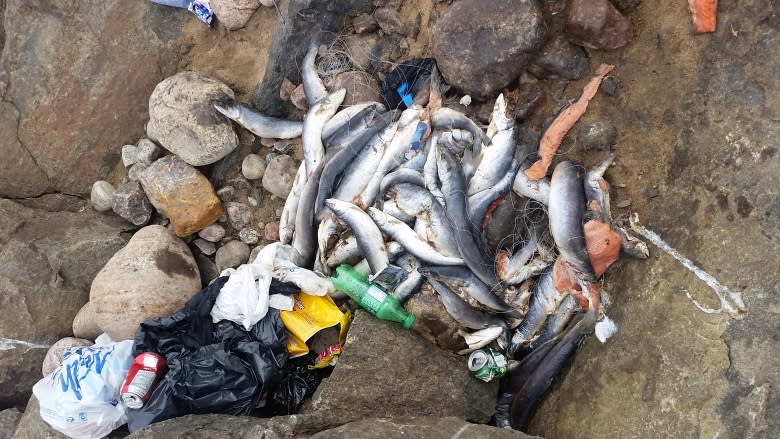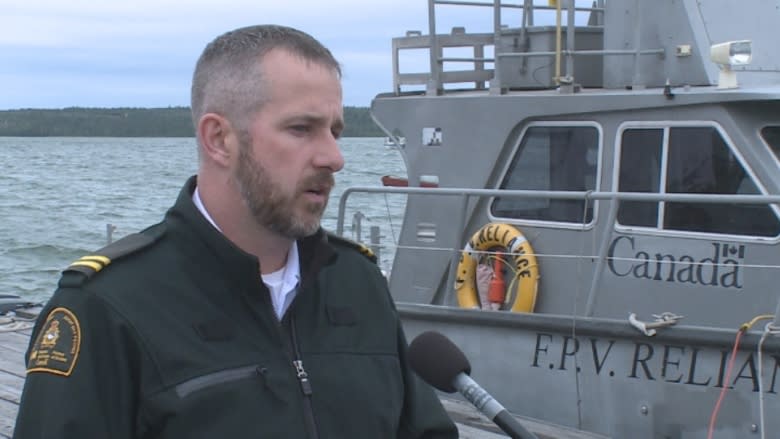'Wastage is not allowed by anyone': Rotting fish plaguing Iqaluit's shores again
They're easy to spot, even from a distance: swarms of buzzing mosquitoes and a wafting putrid smell, they litter the shores of picturesque fishing spots at the Sylvia Grinnell River in Iqaluit
It's a problem that pops up every few years; rotting fish left as waste by fishers who snag more than they need or are able to use. Reports of fish wastage in Iqaluit date back to the late 90s.
Once again, this summer, people in Iqaluit are spotting piles of wasted Arctic char near popular fishing spots on the Sylvia Grinnell River.
Last week, Mosie Pudloo posted a picture on Facebook of 15 dead fish on the rocks along the river.
Since then, people in Iqaluit have found dozens of dead fish in the shallow waters as well as floating near the falls of the river, a spot where people like to snag fish that try to swim up river.
'Fishery officers can't be everywhere'
"Wastage is not allowed by anyone," said Gerald Fillatre, the detachment supervisor with the Department of Fisheries and Oceans.
"In regards to snagging, Aboriginals and beneficiaries are allowed to [catch] subsistence fish via that method. Non-Aboriginals, who are sport fishing, are not allowed to snag."
But Fillatre admits, with only seven fishery officers based in Iqaluit, who enforce all fishery laws, including supervising bowhead and narwhal hunts all over the territory — there's little enforcement can do about the wastage in Iqaluit.
"Fishery officers can't be everywhere," said Fillatre.
"We really look to the public for support to forward complaints like this to us so that we can go out and find cases," he added.
The last two charges for snagging in Nunavut were laid in 2014 according to DFO. Before 2014, no charges had been laid for people leaving fish for dead along the river.
The consequences for wasting fish can range from having your equipment — including your fishing gear and boat — seized to paying a fine that can range from hundreds to thousands of dollars, according to Fillatre.
Fillatre said anyone who applies for a sport fishing license is given a guide that explains the rules and regulations.
Inuit land claim beneficiaries don't need a fishing license.
Every fish counts
Although the current stock of Arctic char is healthy, Fillatre said conservation is always an issue.
"Every fish that comes out of the water can affect the population of future years," he said.
"So it's important that those fish do get back into the water if people aren't going to use them for food."
Since snagging is indiscriminate, people can catch all kinds of fish, including small pre-spawning fish that are important for the recovery of the population.
DFO published a study on snagging in Sylvia Grinnell in 2008. They found that a minimum of about 2993 char were estimated to have been caught and discarded at the falls by snagging each year.
The study said: there is "insufficient data to conclude that the practice of snagging fish poses a 'conservation concern' for the population."
However, the study did suggest that closing the area below the falls in Sylvia Grinnell to all fishing in August would have a greater benefit for the fish population than banning snagging.
The Amarok Hunters and Trappers Organization closed Sylvia Grinnell to netting and snagging for five years from 2002 to 2006.
The 2008 DFO recommendation to close this area again has not been implemented.
Fillatre added that the rotting fish can also attract unwanted wildlife such as seagulls, foxes and even bears.
DFO is asking anybody who comes across wasted fish to contact them at their Iqaluit office at 867-979-8000. Reports can be made anonymously.




